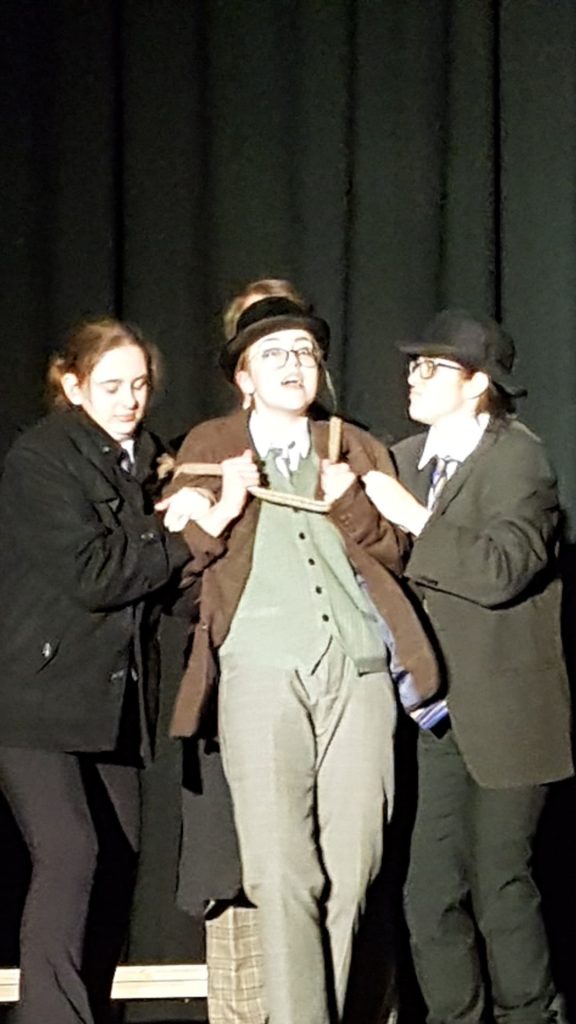To take a play from one of America’s most iconic comedians (Woody Allen) and gel 19 Freshers into an effective unit is a rather tall order, and yet debut director Lauren Brewer has managed to mastermind something both entertaining and thought-provoking at Hild Bede Theatre company.
Focusing on the insanity and anxiety of an urban community gripped in the clutches of a maniacal killer, ‘Death’ is unsettling from the opening scene, when a mob of citizens bang on protagonist Kleinman’s door in the middle of the night to demand that she join their frenzied hunt for the murderer. Reluctantly, Kleinman joins the investigation, all the while unaware of her exact role in it; only the mob’s leader, Hacker, knows the full plan.
Charis Phillips plays the role of Kleinman excellently, chilling in her portrayal of the saleswoman’s self-doubt. After being abused by her frustrated accomplices, who are all too enthusiastic in their rampage to find the murderer, Kleinman wanders the darkening streets alone, jumping at every sound, shivering at every footstep. Through a series of soliloquies, Phillips establishes a personal relationship with the audience, and a relationship the audience clings to- the other characters are the unhooked sort you might want to stay away from.
Seána Johansson-Keys expertly plays one of these such characters, the prostitute Gina, whose sultry attempts at seduction and rambling speech about extra-terrestrial life only add to the tension when the audience knows a murderer could lurch out of the shadows at any moment. And then there’s the Doctor, played by Elise Garcon, who fully expresses the character’s arrogance and disconcerting obsession with the murderer to act as a foil to Kleinman and further reveal Kleinman’s outsider status in the group she has joined.
The comedic effect of the play is notable; there were several laugh out loud moments. Be it through already-dead characters crawling off the stage behind the other character’s backs (which added a dramatic irony resembling that of a pantomime), the nonsensical scuffle between the opposing maniac-hunting tribes who can’t agree on one unified plan, or the unexpected courtesy from the killer when they finally meet Kleinman in politely asking “can I sit down?”, this play fully lives up to its genre of comedy.
By far the most arresting character is the one with the least stage time: Spiro the telepathic. Dressed elaborately, Kitty Street nails the swagger of this pivotal character, who is worshipped by all for her “ability” to identify the killer with her sense of smell. The ridiculous kangaroo court set up to consider the execution of the character she ‘identifies’ makes you want to stand up and protest against the stupidity of the logic in a hilarious climax to the play.
‘Death’ is a fast-moving whirr of ideas and can be tricky to follow. At times it is easy to get lost in the tangle of characters, unexplained incidents and clumsy tangents about big philosophical questions. The play wants you to be a certain kind of observer: one completely willing to go along with the crazy ride, one willing to accept the explosive temper and insane logic of everybody besides Kleinman, one willing to embrace all the questions left unanswered.
Everybody left the theatre talking about ‘Death’. I left the theatre itching to write about it. On my meander home through the murky streets, I felt paranoid when a stranger started to walk too close behind me. One might conclude that ‘Death’ is a play that will wedge itself in your mind for a little while. If a one-hour comedy can have such a disturbing effect, it must be quite an impressive one.
By Luke Power
